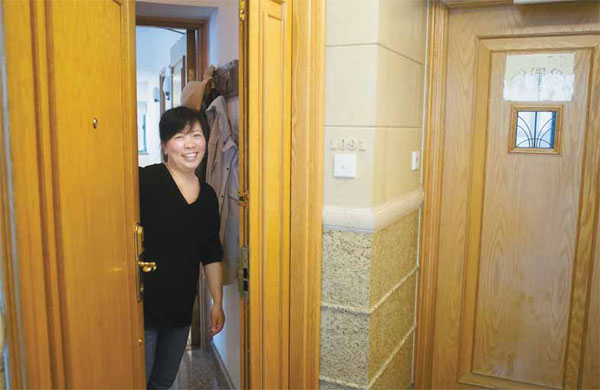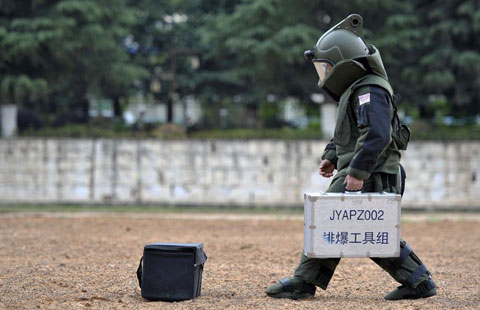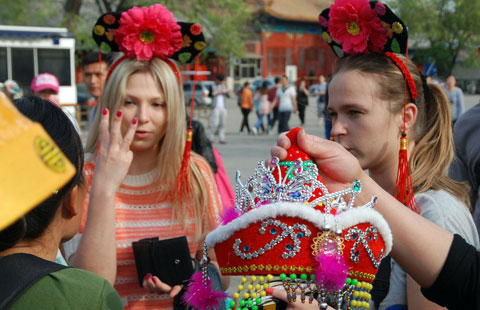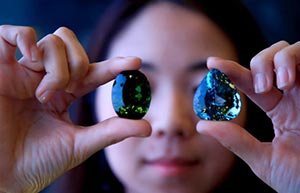Help at home is maid to order
( China Daily ) Updated: 2013-06-04 07:47:58Better skills give ayi an edge with expat families, Xie Yu reports in Shanghai.
Xue Qianchun, 35, carefully used a chef's knife to chop bell peppers and onions. After that, she put some ginger into a food processor and reduced the spice to powder.
"Indian cuisine places great emphasis on the use of a lot of seasoning. For example, I use lemon juice instead of vinegar to impart a sour taste to cooked rice," said Xue, as she added oil to a pan and sauteed cardamom, cinnamon, cloves and bay leaves.
 |
|
Xue Qianchun, 35, an Anhui native, has worked for many Shanghai-based expats during the past 10 years. [Photo by Bao Erqiang/China Daily] |
If this image makes you think that Xue is an Indian chef, you would be wrong. She is actually an ayi, the Chinese word for maid, with long experience working for foreign families in Shanghai.
Xue's colorful story is one of determination, the type that could prove inspirational to anyone from a poor family and lacking a college education.
After 10 years in the service industry, Xue has worked for people from countries such as France, the United Kingdom, South Korea, Italy, Belgium and the United States. Her two part-time jobs bring in a combined income of 7,000 yuan ($1,140) a month, higher than that of many junior office workers in Shanghai.
In 1999, Xue and her husband moved to Shanghai from Anhui province in East China and she became a street cleaner. Her working day began at 6 am and ended 12 hours later. She worked six days a week for a mere 600 yuan per month.
She remembers clearly how things started to change.
"My first foreign client was from the Philippines. At that time I had no idea how to use an electric vacuum cleaner and I only knew a few words of English," she said.
Her most nerve-wracking moment was when she realized she couldn't understand the instructions her boss had given her, so Xue used all her spare time to study English. She took notes and ran through them in her mind when she was riding her bike or at the food market, sometimes even in her dreams.
"Every one laughed at me. They asked me if I was crazy, and if I was going to take the college entrance exam," she said. Working for expats, known in Chinese as laowai, is actually more demanding than working for regular Chinese families, according to Xue.
The basic requirements include cleaning the bathroom and scrubbing floors every day. At least once a week, the ayi does the family laundry and irons bed sheets. Work in the kitchen is challenging, too; maids have to learn about Western seasonings, which often make no sense to them at the beginning. However, since she began working as an ayi, Xue has learned to prepare a variety of Western dishes, including basil pesto, avocado dip, bell-pepper rice, and red-chilli beef.
Huge market
"Twenty-four million people work in China's household service industry and I would say that people like Xue are the rarest of the rare. They belong to a very small premier circle that accounts for just 1 to 2 percent of the total," said Amanda Sheng, 30.
In 2010, Sheng set up an agency, MD Maid Service, to provide domestic service for Shanghai-based expats. In the first year of business, she won 15 contracts, but now, the number has soared to 200.
The most-recent census, conducted by the Shanghai authorities in 2010, showed that there were more than 200,000 expats living in the municipality. Today, the number is expected to have risen greatly.
"The number of expat families in Shanghai is huge, and growing every year. Since we opened in 2005, our company has seen client numbers grow by 20 to 30 percent annually," said Cindy Xu, marketing manager of CC Shanghai, an agency that provides maid services.
The agency also cooperates with the human resources departments of a number of foreign-invested companies to find ayi, the word can be both singular and plural, for newly relocated workers in Shanghai.
|
|
|
|
|
|
|
|


















 Op Rana
Op Rana Berlin Fang
Berlin Fang Zhu Yuan
Zhu Yuan Huang Xiangyang
Huang Xiangyang Chen Weihua
Chen Weihua Liu Shinan
Liu Shinan